Kroger Runs 7,000 App Instances on Pivotal Cloud Foundry and Kubernetes
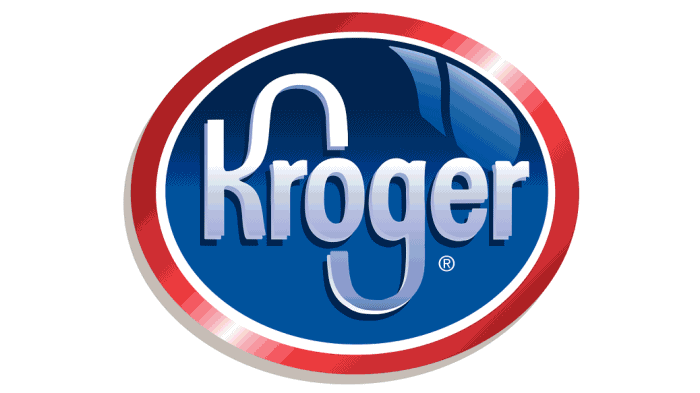
Retail: Pivotal Cloud Foundry is used for digital transformation of a large, 130-year-old grocer.
- Pivotal Cloud Foundry now hosts 7,000+ app instances, with 400+ applications in production, and has already helped to provide 5+ billion coupon downloads for customers.
- The use of PCF enables thousands of associates to work with the same platform and start building apps within few hours—instead of 7 days it took peviously.
- Now, all security elements are in place within seconds, instead of 4 weeks needed earlier.
- One step at a time.
- Management buy-in is essential, as is continued teamwork.
- Make sure that "best practices" are actually practiced.
- Drive creating documentaton as part of your culture.
VMware
vCloud Director, vCenter Orchestrator, VMware NSX-T Data Center, Spring Initializr, Spring Boot, .NET, Cassandra, Apache Kafka, RabbitMQ, Kubernetes, Calico
Kroger is the largest grocer in the US, with department stores and jewelry sales complementing the grocery business. Based in Cincinnati, the company is 130+ years old, having more than 2,700 stores. Kroger also runs 2,200+ in-store pharmacies, 1,500+ fuel centers, 250+ jewelers, and 30+ food production plants (as of March 2019). Each day, these facilities serve 14 million customers. With annual revenues of $121.16 billion (2019) and 443,000 employees (2017), Kroger is the fifth largest retailer in the world.
Barney Kroger opened his first grocery store in Cincinnati in 1883, investing life savings of $372.
The need to deliver software faster
The largest grocer—and second largest retailer—in the United States, Kroger generates more than $120 billion in annual revenue from more than 3,000 locations (as of 2019).
The company’s cloud journey began in 2007 with integration of VMware into the organization. As a result, 90% of the company’s IT infrastructure was virtualized across more than 45,000 VMs. A second stage commenced in 2013 with integration of vCloud Director and vCenter Orchestrator, according to James Masters from Kroger’s IT operations side.
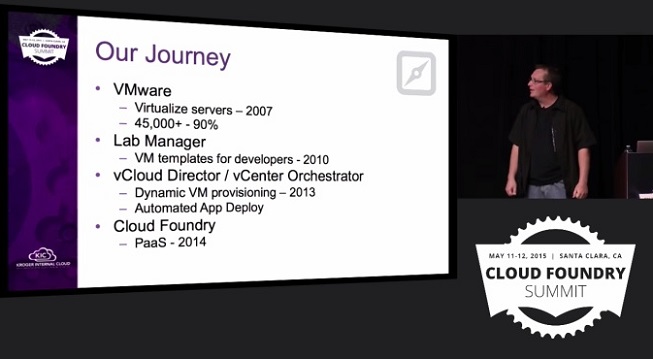
“Getting the VMs was well-received but still a challenge,” Masters explains, noting the burdens of this complex infrastructure.
“The hard part is not deploying systems. The hard part is managing them.” —James Masters, Kroger
To speed up the process, the devs and ops sides got into Pivotal Cloud Foundry (PCF) in 2014 “as a next step,” according to Ted Tollefson of Kroger. Within 5 years, the company managed to make PCF the standard across the departments, letting its IT teams move faster.
Kroger Internal Cloud
The company has thus arrived at what it calls its Kroger Internal Cloud (KIC) initiative. “We’re doing this from a business perspective, because we want to consolidate platforms and needed elastic scaling to scale horizontally. We need to scale more gracefully as the business continues to grow. From the DevOps perspective, we want to develop 12-factor apps and add a lot of automation.”
The integrated team uses Spring Initializr as part of its effort to automate project provisioning.
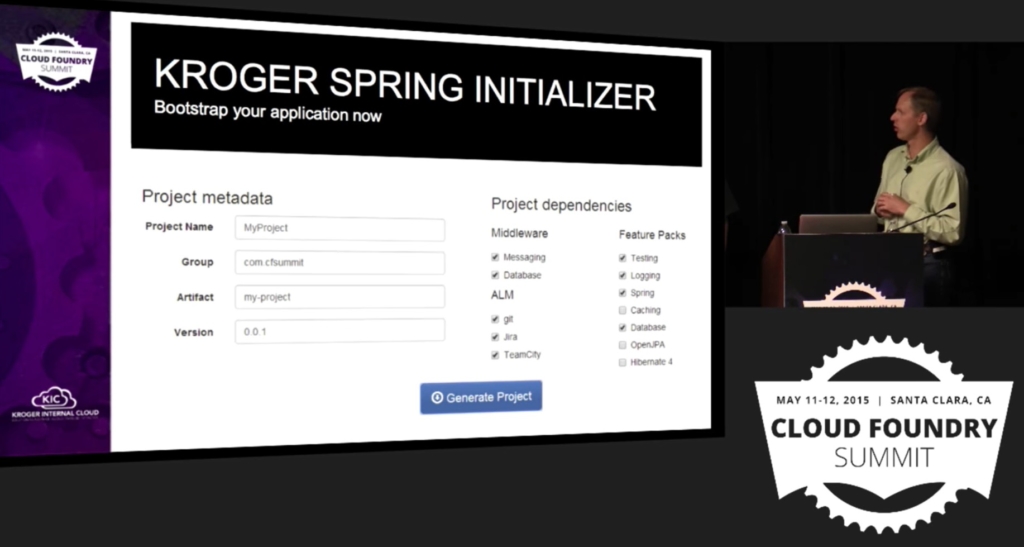 Ted Tollefson demonstrating Spring Initializr within KIC
Ted Tollefson demonstrating Spring Initializr within KICTeam members can type in a few parameters and fork base sets of code, then use enhancements to create stash repo checks and create continuous integration builds. “We are able to set up best practices right from the start,” according to Masters. “It takes 10 minutes to get code, ALM tooling, and be ready to go.”
“Now, we’re not only orchestrating and provisioning middleware and databases, but also focusing on orchestrating an entire project initiation.” —Ted Tollefson, Kroger
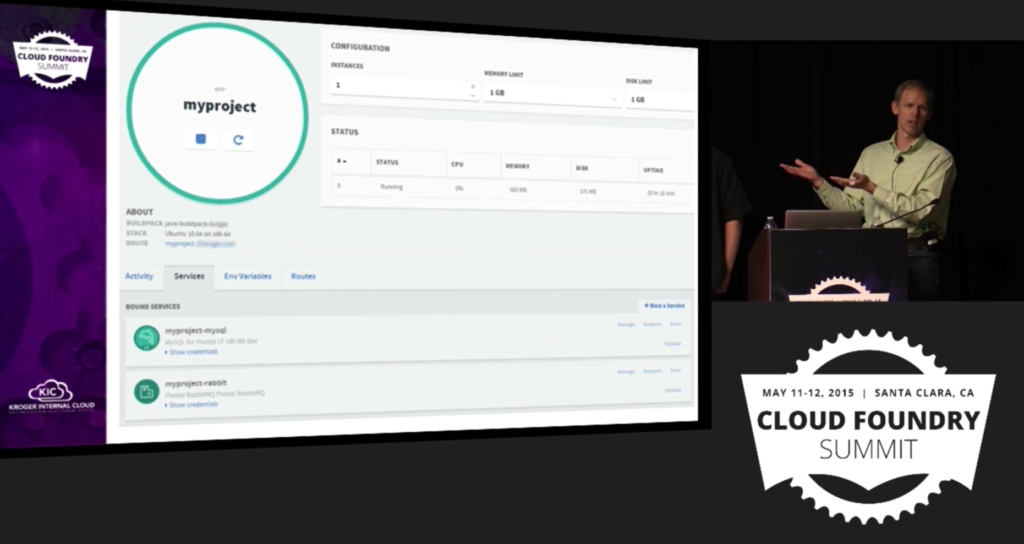 Pivotal Cloud Foundry within Kroger Internal Cloud (KIC)
Pivotal Cloud Foundry within Kroger Internal Cloud (KIC)In 2015, with a pure VMware stack underneath, the company was also looking at VIO (VMware Integrated OpenStack) and “playing around” with other hypervisors. The Kroger team also was exploring additional resources to scale out with the Cassandra data store in the future.
The DevOps culture
Masters and Tollefson agree that there have been benefits to developers and to operational managers:
- For developers, “the platform “makes it easy to do the right thing” due to automated functional testing, continuous delivery, and infrastructure as code.
- Managers can enjoy faster project provisioning, higher consistency, a consolidated platform, and auditable environments.
Within this context, Ted Tollefson says, “Devs and ops have started working more together. We do a lot of orchestration, exposing infrastructure.”
“We’re marrying the orchestrations of devs and ops, creating a running environment, with applications deployed.” —Ted Tollefson, Kroger
As the KIC initiative progresses, the integrated team will continue to think of infrastructure in terms of code and working to having a common platform. In this process, management buy-in is essential, as is continued teamwork. “If you spin stuff up but don’t have support, there will be a very short flight,” Masters points out.
Results
As of 2019, Kroger runs 400+ apps and 7,000+ app instances on Pivotal Cloud Foundry. The use of PCF enables thousands of associates to work with the same platform and start up within few hours—instead of 7 days it took peviously—according to Elijah Savage, VP of Infrastructure Services at Kroger.
“With our previous platform, I had a huge amount of human capital resource invested. Today, our associates can stand up an environment, go build an application, connect to the resources they need, and get it functional in hours.” —Elijah Savage, Kroger
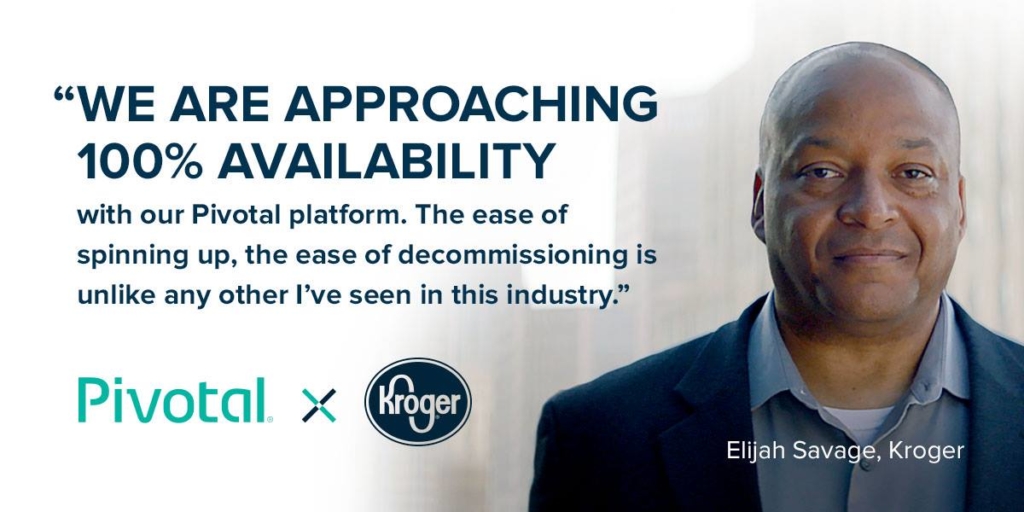 Image credit
Image creditAcross departments, “everyone is spreaking the same language now,” notes Elijah.
The platform also accelerated security procedures for the deployment of apps. “We used to have developers spending roughly 4 weeks of calendar time to get all the security elements they needed for their projects,” says Michael Ehrman, Information Security Manager at Kroger. “Today, they get everything they need in a few seconds.”
“We started launching apps into production, and went from 4 apps to 40 apps to 400 apps, and it’s been great for running our entire e-commerce business.” —Sean McShay, Director, Cloud Services, Software Architecture and UX, Kroger
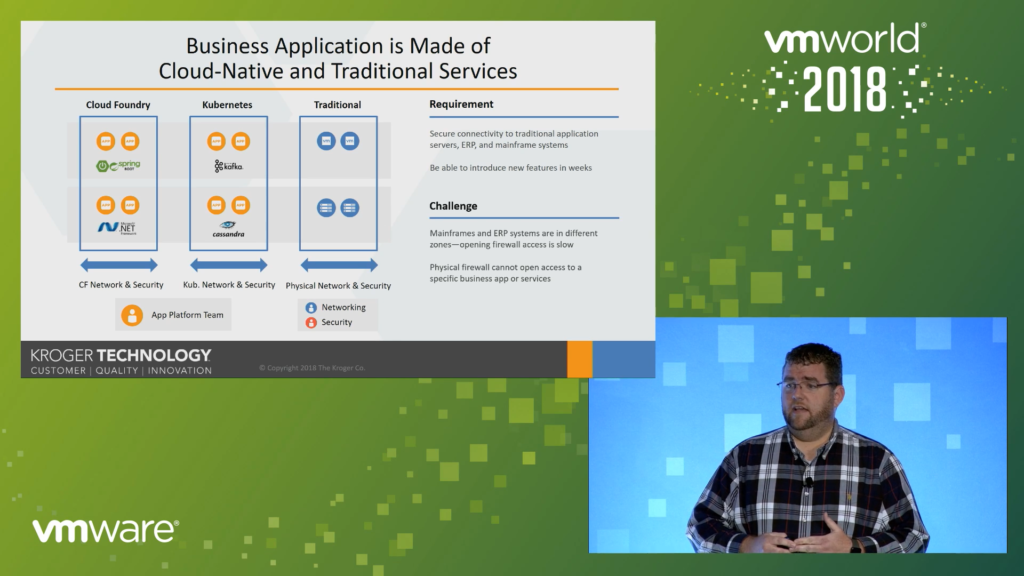 Jon Ravenscraft of Kroger describes container networking issues (Image credit)
Jon Ravenscraft of Kroger describes container networking issues (Image credit)The company is also working on accelerating the results by integrating containerized apps and services between Cloud Foundry, Kubernetes, and other systems. At Kroger, an organization with a long history, even mainframes are in the mix. To support this complex environment and efficiently manage container networking and load balancing, Kroger relies on VMware’s infrastructure platforms, such as NSX-T Data Center.
Want details? Watch the videos!
About the experts
 Ted Tollefson has been a software architect at Kroger for almost 10 years. He has done Java EE development for over 15 years and has been actively engaged in cloud development efforts. Prior to Kroger, Ted has served as a consultant, worked for Bertelsmann in Munich, and assisted BASF within their advanced technologies group. He’s a true geek at heart and grooves on the rapid provisioning capabilities of the cloud.
Ted Tollefson has been a software architect at Kroger for almost 10 years. He has done Java EE development for over 15 years and has been actively engaged in cloud development efforts. Prior to Kroger, Ted has served as a consultant, worked for Bertelsmann in Munich, and assisted BASF within their advanced technologies group. He’s a true geek at heart and grooves on the rapid provisioning capabilities of the cloud.
James Masters has held multiple roles at Kroger since 2003. He started his career at the company in the information security space and then moved into system administration. James currently leads virtualization, cloud, and automation initiatives at Kroger, and has been doing so for over 5 years. Prior to that, James was in information security at Fifth Third Bank and in system administration at GE.
Elijah Savage is Vice President of Infrastructure at Kroger. Previously, he worked as a network engineer at Reynolds & Reynolds and CSC. Elijah is an expert in all things infrastructure, including cloud computing, data centers, networking, etc.







